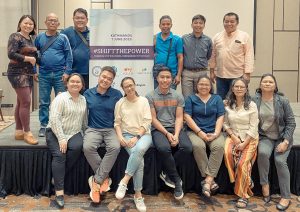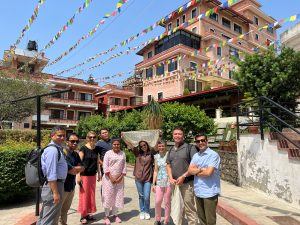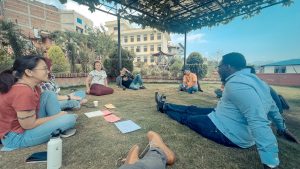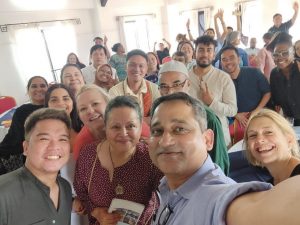Amidst the limitations of traditional aid, beacons of hope emerge
12 Jul 2023
In a powerful gathering of Abot-Kamay Community Solidarity Fund (ACSF) partners held in the vibrant Quezon City, Philippines in May this year, an unsettling truth came to light: an undercurrent of mistrust towards local and national NGOs from community-based organizations. This is largely fuelled by NGOs’ pressure to emulate the practices of INGOs.
This revelation hit many in the room hard, piercing through our collective consciousness.
For the Center for Disaster Preparedness (CDP), it served as an important wake-up call. For some of us, this was a known fact. For others, it has further compelled us to reflect on the way we work with peoples’ organizations and community-based organizations, and how we fundamentally relate to our partners. We have been confronted with the weighty responsibility of examining and re-evaluating our commitment to local accountability and transparency.
Realizing that our partners deserve more from us is both humbling and challenging. We have recognized the urgent need to shed the cloak of complacency and walk a transformative path that restores faith and fosters genuine trust. This trust holds the power to unleash the potential of the “moveable middle” and to revolutionize our ability to access resources that complement traditional development aid (while we’re in the process of birthing a new system).
“Realizing that our partners deserve more from us is both humbling and challenging.”
There’s still much to learn. We’ve only been implementing ACSF for a little over a year. The apparent hurt and sentiments of our partners towards NGOs are valid, so it did not take a lot of convincing for them to rally behind the #ShiftThePower movement. They too yearn for a different way of doing “development.” So we were excited to have the opportunity to bring community organizers from Luzon, Visayas, and Mindanao to a recent gathering of Global Fund for Community Foundations (GFCF) partners and allies at the magical Tewa Center in Kathmandu later in May, only a few days after our convening in Quezon City.
What they learned there is that our experience in the Philippines is not unique. Colleagues from across Asia, Africa and Europe also described how the current operational frameworks of local and national NGOs in their countries mirror that of INGOs. The emphasis is on extensive reporting and compliance rather than genuine community engagement, relationship building, and hands-on work — areas in which community-based organizations excel, even with limited access to resources.
In the context of deeply entrenched development issues, quick-fix and linear interventions simply fall short. What is truly needed is a multi-faceted strategy and sustained approach. Community-based organizations in the Philippines have already demonstrated their ability – and in many cases, necessity – to sustain their efforts, proving that they are capable of creating lasting impact. In Kathmandu, we discussed how imperative it is to provide concrete evidence that channelling development aid to these smaller organizations, without expecting them to replicate the operational requirements of INGOs, is key to achieving meaningful change and shifting outdated power dynamics.
“Unfortunately, the assessment of who has ‘capacity’ has been weaponized and used as a means to justify the slow relinquishment of power by INGOs and their hollow promises of localization.”
Unfortunately, the assessment of who has “capacity” has been weaponized and used as a means to justify the slow relinquishment of power by INGOs and their hollow promises of localization. We require more individuals actively engaged in community work and fewer confined to their desks, endlessly reporting to donors. Paradoxically, the technical skills that are required to satisfy donors by showcasing how their funds are being utilized are disproportionately valued over and above the actual groundwork that leads to the desired impact being achieved – the reason for the funding being allocated in the first place.
Urging INGOs to embrace #ShiftThePower ideals is undoubtedly an uphill battle, as it requires them to relinquish or moderate their access to vast resources. But it is high time we challenge this prevailing imbalance. By redirecting focus towards empowering and amplifying the voices of local organizations, we can break free from the shackles of outdated norms. Genuine transformation happens at the grassroots level, where passionate individuals work tirelessly to uplift their communities. Only by embracing a truly participatory and inclusive approach can we effectively #ShiftThePower and foster sustainable change that transcends the limitations of traditional aid models.
Conversations like those we had in Kathmandu – which dig deep into the unequal power dynamics we face in our work – matter because they expose inequalities, empower marginalized voices, challenge imbalances, foster accountability and build a movement for transformative change. These are essential ingredients for creating a fairer, more just and inclusive world.
In the relentless struggle for survival, the oppressed bear the weight of their daily existence. Yet, amidst their tireless efforts, community-based organizations emerge as beacons of hope, dedicated to unveiling the invisible forces that govern their lives. These organizations stand as a collective force, poised to challenge and disrupt the status quo, driven by the hope of mobilizing a critical mass for change.
By: Michael Vincent Mercado, Program Coordinator for Technical Assistance at the Center for Disaster Preparedness
This blog was written following a meeting of GFCF partners and #ShiftThePower allies held at the Tewa Center in Kathmandu in May 2023. The convening was a deliberate effort to bring together people from different parts of the civil society ecosystem, whether they were working on community philanthropy, gender, climate, community development, indigenous rights, disaster preparedness and relief, localization or peacebuilding (or a mixture of several of these) to explore the idea of the “system we want.”







Wonderful write up of an inspiring event. Carry on!!!!
There need for INGOs to really localize their intervention strategies is as good as decolonizing the people whom they govern in the past. It creates a lot of learning, delegation of duty, sharing of experience and devotion of power and experience.